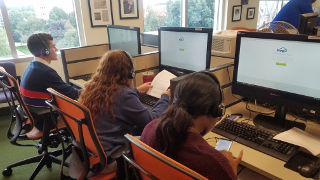Sports Poll on Image and Likeness Pay for College Athletes Featured in Washington Post, USA Today
Wednesday, November 13th, 2019

The findings were also featured in an article of the American Institute for Economic
Research, "Prohibition Is Ending in College Sports."
Previously, these findings on "image and likeness" were featured by ESPN, USA Today, Darren Rovell of Action Sports via Twitter (Rovell has 2.1 million followers), CBS Sports, NBC Sports, polling heavyweight FiveThirtyEight, Inside Higher Ed, Football Scoop, MSN, Yahoo Finance, Morning Consult and a number of other media outlets.
Most recently, in the Washington Post, columnist Sally Jenkins writes in "The NCAA's noxious behavior has done the impossible: Unite political ideologies":
Polling shows that public opinion runs against the NCAA on the issue of athletes' rights to earn a fair dollar off their own likenesses. A recent poll out of Seton Hall found 60 percent of Americans think athletes should be allowed to profit from the use of their own name or image, such as by endorsing sneakers or apparel. A 2017 Washington Post/Massachusetts Lowell poll found that 66 percent of adults believe athletes should be paid if their name or image is used in NCAA merchandising.
In short, the NCAA has a massive credibility problem. The public isn't buying the NCAA's fallacious contention that such a thing would damage "the collegiate model." They see university administrators for the canny fiscal pirates they are.
In USA Today, syndicated columnist Dan Wolken wrote "How the game changed in college sports: 'It's like lighting a fuse.'"
But almost like a light switch flipping on in the middle of the night, the political environment around the rights of college athletes shifted completely in a matter of a few months. An issue that had been largely kept on the margins — whether college athletes should be allowed to profit off their name, image and likeness — was suddenly activated as a key legislative priority in California with the Fair Pay to Play Act, spreading to other state legislatures that introduced similar bills and renewed interest at the federal level that could lead to legislation in the near future.
"It wasn't until California passed it in their state legislature that this thing, I mean, it's like lighting a fuse," said Rep. Mark Walker, R-N.C., who introduced a bill in March that would strip the NCAA of its tax-exempt status unless it allowed likeness rights. "It took off."
The NCAA has read the tea leaves and responded, announcing last month that it had voted to allow athletes to "benefit from the use of their name, image and likeness in a manner consistent with the collegiate model." While the specifics of that plan are still to be determined, and may ultimately not satisfy lawmakers, NCAA president Mark Emmert acknowledged that political pressure pushed the NCAA to make this move….
But it's also unlikely that so many politicians would pursue this if it was a wildly unpopular idea. Over time, opinion polls have shown that Americans increasingly agree with allowing college athletes to profit from their name, image and likeness, including a recent Seton Hall poll that showed a 60% to 32% split. Even more telling is that 80% of respondents ages 18 to 29 were in favor.
Illinois Gov. J.B. Pritzker compared the undercurrents in public opinion to how the country has shifted on issues like gay marriage and marijuana legalization, which became much more popular after states began to look more closely at them.
"A year after the first few cases that occurred, you saw the polling data change. It went from 40-60 against to 70-30 in favor in a very short period of time because people woke up and paid attention," said Pritzker. "Even some conservatives came around and said, 'Yeah if you're all about individual freedom, why shouldn't people have the freedom to marry one another?' I think this issue of whether a college athlete should get compensated for their image and likeness, whether it's OK for a college athlete to get any money, it's an issue that has kind of been in the back of people's minds and then over the last year there's a lot of attention put on it."
And, in fact, one of the primary reasons why the NCAA is boxed in on this issue politically is that support for name, image and likeness rights has generally crossed party lines. While there may not be overwhelming support for any legislation that may happen on a federal level, the fact that there are high-profile senators from the both sides of the aisle involved in this means the NCAA can't expect one party or the other to help them out.
"Part of this is just non-political, and the interest I think is generated by sports fans in Congress, but there's a civil rights aspect to this," Murphy said. "These are largely African-American players that are being kept poor in order to enrich white athletic directors, coaches and sports company executives. But there's also a free market element to this discussion. There's no other marketplace in the country in which the people providing the labor should be compensated millions of dollars and are instead being given no salary. So if you're a free market Republican it's hard to defend this system, and if you're a civil rights Democrat it's hard to defend this system."






